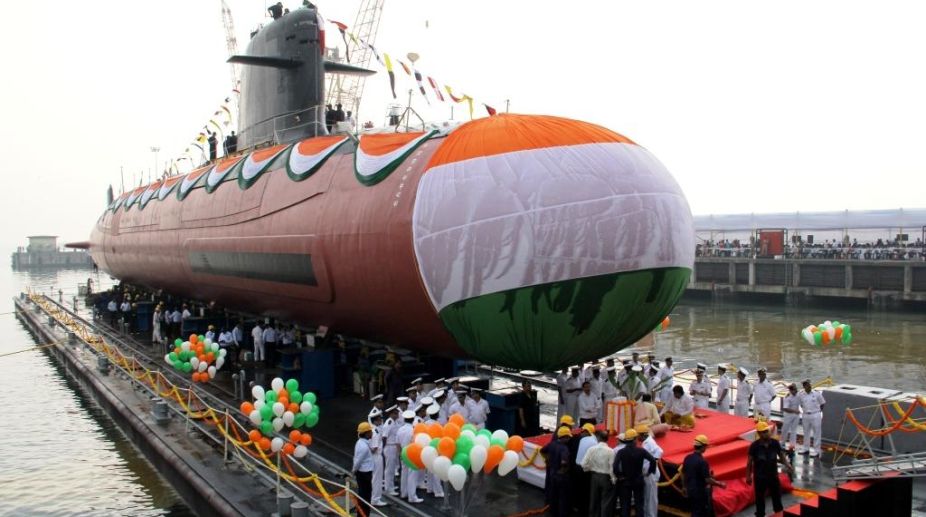The commissioning of the first Scorpene-class submarine – ‘INS Kalvari’ – into the Indian Navy reaffirms the giant strides taken under the ‘Make in India’ programme, defence PSU Mazagon Dock Shipbuilders Ltd (MDL) said today.
The induction of Kalvari into the Indian Navy would be a game-changer in the field of underwater warfare and its commissioning has added another feather in MDL’s cap, the shipbuilder said after Prime Minister Narendra Modi commissioned the submarine at the naval dockyard here today.
Advertisement
“The commissioning of INS Kalvari reaffirms the giant strides taken by Mazagon Dock Shipbuilders Ltd in the ongoing ‘Make In India’ programme, which is being actively implemented by the Department of Defence Production (Ministry of Defence),” the MDL said in a statement.
“MDL is constructing six Scorpene-class submarines with technology transfer from M/s Naval Group (formerly known as DCNS) of France,” it read.
Commodore (retd) Rakesh Anand, the chairman and managing director of MDL, said the induction of Kalvari into the Indian Navy would be a game-changer in the field of underwater warfare due to its superiority in all operational aspects.
He also highlighted the aspect pertaining to completion of all weapon firings prior to commissioning of the submarine which, he said, was indeed a unique achievement.
The technology used in the submarine has ensured superior stealth features, such as advanced acoustic silencing techniques, low radiated noise levels, hydro-dynamically optimised shape and the ability to launch a crippling attack on the enemy using precision guided weapons, the MDL said.
An attack can be launched with both torpedoes and tube- launched anti-ship missiles, whilst underwater or on surface, it said.
The stealth of this potent platform is enhanced by the special attention given to various signatures. These stealth features give it invulnerability, unmatched by most submarines, the statement said.
The Scorpene submarines can undertake multifarious types of missions, such as anti-surface warfare, anti-submarine warfare, intelligence gathering, mine laying and area surveillance, it said.
The submarine is designed to operate in all theatres, with means provided to ensure interoperability with other components of a Naval task force.
It is a potent platform, marking a generational shift in submarine operations, it said.
“The building of the Scorpene was indeed a challenge as the complexity of the simplest of tasks increased exponentially due to all work having to be done in the most congested of spaces,” the MDL said.
“This complexity was further aggravated due to the stringent tolerances required to be achieved. However, these challenges were successfully overcome by MDL, without any compromise in quality,” it said.
The second of the Scorpenes under construction at MDL, Khanderi, was launched in January 2017, and is undergoing rigorous sea trials.
The third Scorpene, Karanj, is being readied for launch shortly.
The remaining three submarines are in various stages of outfitting. The project is expected to be completed by 2020, the MDL said.
Kalvari is named after the dreaded tiger shark, a deadly deep sea predator of the Indian Ocean.
As is the tradition, ships and submarines of the Navy, are ‘re-incarnated’ after decommissioning, the MDL said.
So it is with Kalvari. The first Kalvari, commissioned on December 8 1967, was also the first submarine of the Indian Navy. It was decommissioned on May 31, 1996 after almost 30 years of yeoman service to the nation.
“The experience and expertise that MDL has gained from the Scorpene project together with enhanced and upgraded infrastructure has ensured that the shipyard is fully geared for undertaking construction of the next generation submarines,” it said.











